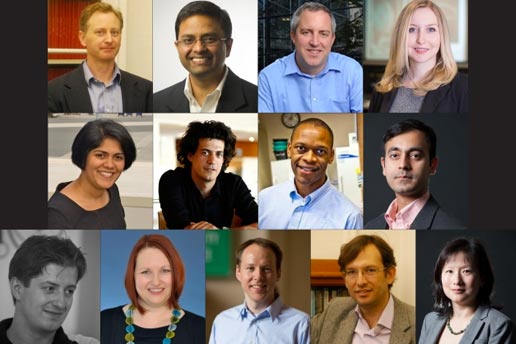
The School of Engineering has announced that 13 members of its faculty have been granted tenure by MIT, with appointments in seven of the eight academic departments in the School of Engineering.
“This year’s group of newly tenured faculty is remarkable not only for its breadth, but for the quality of their research and teaching,” says Ian A. Waitz, dean of the School of Engineering. “These are truly outstanding people who have had an enormous impact on MIT and their fields, both through scholarship and through teaching and mentoring students.”
This year’s newly tenured associate professors are:
- Alfredo Alexander-Katz, the Walter Henry Gale (1929) Career Development Professor in the Department of Materials Science and Engineering. His research combines theory and simulations to develop a deep understanding of soft-materials systems, with a focus on fundamentally understanding the self-assembly and dynamics of soft materials for novel applications in fields such as medicine, biology, engineering, physics, and chemistry.
- Hamsa Balakrishnan, in the Department of Aeronautics and Astronautics. Her research interests are in the design, analysis, and implementation of control and optimization algorithms for large-scale cyber-physical infrastructures, with an emphasis on air transportation systems. These include airport congestion control algorithms, air traffic routing and airspace resource allocation methods, machine learning for weather forecasts and flight delay prediction, and methods to mitigate environmental impacts.
- Geoffrey Beach, the Class of 1958 Career Development Professor in the Department of Materials Science and Engineering. He studies the behavior of magnetic — or “spintronic” — materials and structures, with an interest in new spin-based concepts in data storage, computing, and nanomedicine, and the fundamental materials properties to enable these technologies. His activities include materials growth, nanoscale patterning, advanced instrumentation development, and a variety of characterization techniques supported by numerical simulations.
- Constantinos Daskalakis, in the Department of Electrical Engineering and Computer Science. His research interests lie in the area of theoretical computer science, in particular algorithmic game theory, computational biology, and applied probability.
- Benoit Forget, in the Department of Nuclear Science and Engineering. His research involves analytical and computational modeling, including a novel data decomposition method that would allow Monte Carlo transport calculations to be performed on systems with limited memory per compute node and novel approaches to the energy variable called the discrete generalized multigroup method. He also works on optimization techniques for reactor design and fuel cycle performance, as well as innovative reactor concepts such as reduced moderation boiling water reactors, molten salt reactors, and traveling wave reactors.
- Colette Heald, the Mitsui Career Development Professor in Contemporary Technology in the Department of Civil and Environmental Engineering. Her research addresses global atmospheric composition and chemistry, and interactions of these with the biosphere and climate system. She works at the intersection of modeling and observational analysis, with a strong emphasis on the integration of the two — from ground stations, aircraft campaigns, and satellite sensors with global models of chemistry and climate.
- Rohit Karnik, in the Department of Mechanical Engineering. His research focuses on the study of microfluidic and nanofluidic transport phenomena and the design of fluidic devices with applications in healthcare, energy systems, desalination, and biochemical analysis.
- Wojciech Matusik, in the Department of Electrical Engineering and Computer Science. His research interests are in direct digital manufacturing and computer graphics, particularly in modeling and physical reproduction of materials, computational photography, and novel display systems.
- Jacquin Niles, in the Department of Biological Engineering. He works to develop new molecular tools to investigate human pathogens — malaria in particular — that have been difficult to study because of our inability to readily and efficiently manipulate their genomes. He is using fundamental biological and chemical concepts to design and build chemically regulated modules that can be used to control gene expression at both the transcriptional and post-transcriptional level.
- Kripa Varanasi, in the Department of Mechanical Engineering. His work is leading toward efficiency enhancements in various industries including energy — from power generation to oil and gas to renewables — water, agriculture, transportation, and electronics cooling, by fundamentally altering thermal-fluid-surface interactions across multiple length and time scales.
- Michael Watts, in the Department of Electrical Engineering and Computer Science. His research focuses on photonic microsystems for low-power communications, sensing, and microwave-photonics applications. His current work is in modeling, fabrication, and testing of large-scale implementations of microphotonic circuits, systems, and networks that are being integrated, directly or through hybrid techniques, with complimentary metal-oxide-semiconductor (CMOS) electronics for high-speed transmitting, switching, and routing applications of digital signals.
- Anne White, the Cecil and Ida Green Career Development Professor in the Department of Nuclear Science and Engineering. She develops radiometers for temperature fluctuations in tokamak reactors, reflectometers and interferometers for density fluctuations, and coupled radiometer / reflectometer instruments that allow for simultaneous measurement of temperature and density turbulence. She aims improve our understanding of fusion reactors, in particular how turbulence is suppressed and how the turbulent-transport of particles, energy, and momentum can be separated from each another.
- Maria Yang, in the Department of Mechanical Engineering. Her research concerns the design of products and systems, with a focus on the fundamental role of informal design representation in driving the early stages of the design process. Her goal is to deepen the theoretical foundations of early-stage design process across product design, engineering design, system design, and beyond in order to develop transformational strategies for the creation of compelling new products and innovative systems.